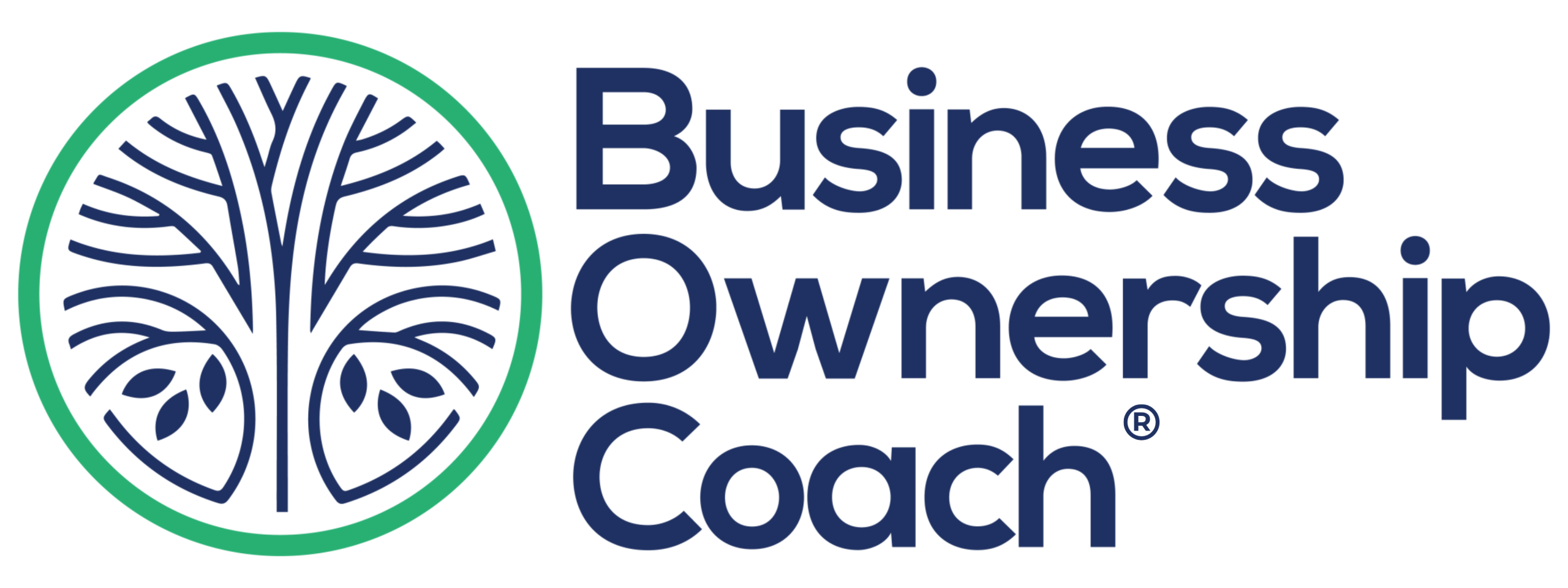I’m Beau Eckstein, Business Ownership Coach®, and in this article I break down the exact checklist I use with clients when evaluating home service franchises. If you’re exploring opportunities from a real estate background or simply want a low-overhead business that scales, this guide is for you. Throughout this post I’ll reference practical examples, franchise disclosure document (FDD) items to inspect, and the strategic questions that separate viable franchise investments from risky ones. Business Ownership Coach® | Investor Financing Podcast will be a recurring frame in this article to help you stay grounded in a proven process.
Why Home Service Franchises Make Sense
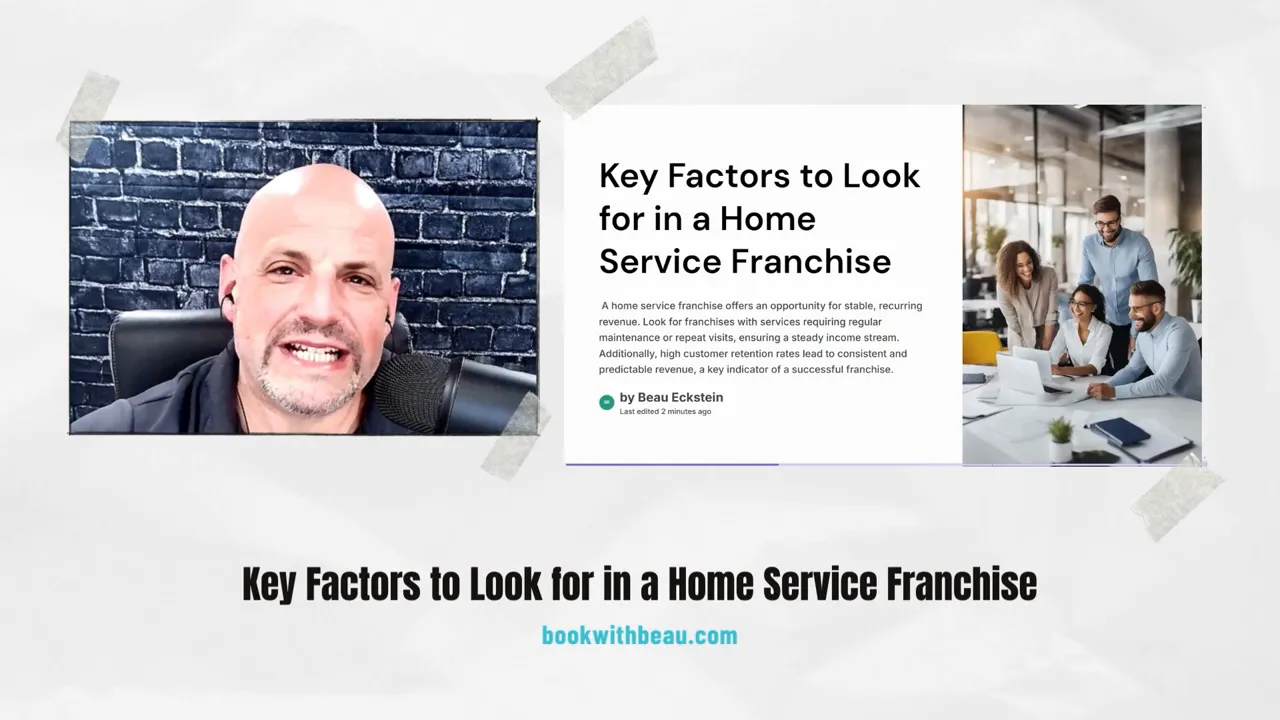
Home service franchises appeal to many prospective business owners for a few consistent reasons: minimal overhead, the ability to operate without a retail storefront, and generally lower startup costs than traditional brick-and-mortar franchises. From pest control to gutter cleaning, these models convert local demand into predictable revenue.
As a Business Ownership Coach® | Investor Financing Podcast host, I often see clients from real estate or corporate backgrounds gravitate to home services because the operations can be systematized and scaled quickly with the right playbook.
1) Recurring Revenue: The Foundation
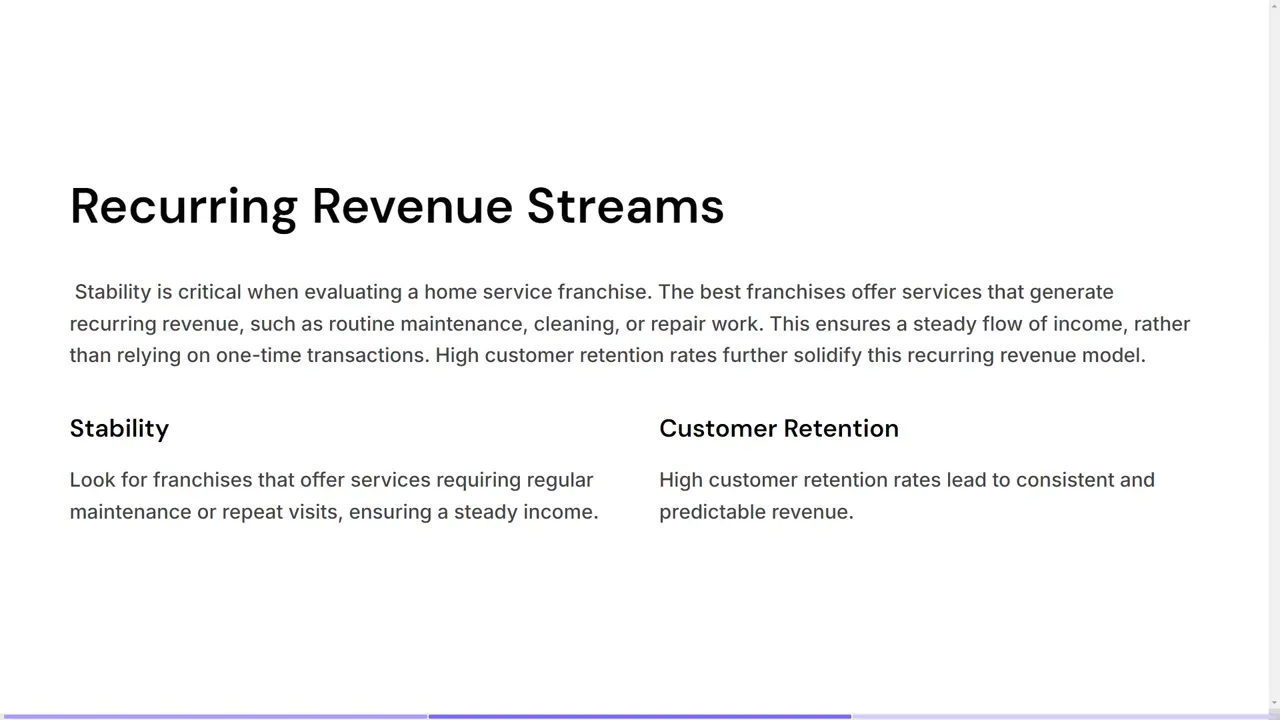
Recurring revenue is the hallmark of a durable home service business. Think pest control, waste management, routine maintenance, or filter replacement programs—these businesses visit homes or properties on a weekly, monthly, or quarterly cadence. The advantages are simple:
- Predictability: You can forecast revenue and staffing needs more accurately.
- Customer lifetime value: Recurring contracts increase the LTV and justify higher customer acquisition costs.
- Financing friendliness: Lenders view recurring revenue favorably when sizing loans or evaluating cash flow.
When evaluating franchises, ask explicitly: Are there long-term contracts? Are those contracts transferable? Are national accounts available through the franchisor? National accounts—property management companies or corporate clients—can massively accelerate growth because they give you access to hundreds or thousands of doors at once.
Throughout my coaching and on the Business Ownership Coach® | Investor Financing Podcast, we emphasize that recurring revenue decreases risk and increases valuation when you decide to sell or refinance.
2) Contract Terms & National Accounts
Photo by David Trinks on Unsplash
Not all recurring revenue is created equal. A five-year recurring contract with auto-renewal is more valuable than a single seasonal visit. Understand typical contract lengths—12, 24, or 36 months—and how sticky they are. Also investigate national accounts: does the franchisor actively pursue and deliver national or regional contracts to franchisees? If so, what percentage of the brand’s revenue is generated by those accounts?
National accounts provide scale and can reduce customer acquisition costs tremendously. But be careful: if the franchisor’s corporate locations dominate those contracts, new franchisees may not see proportional benefit.
3) Emerging vs. Established Franchises
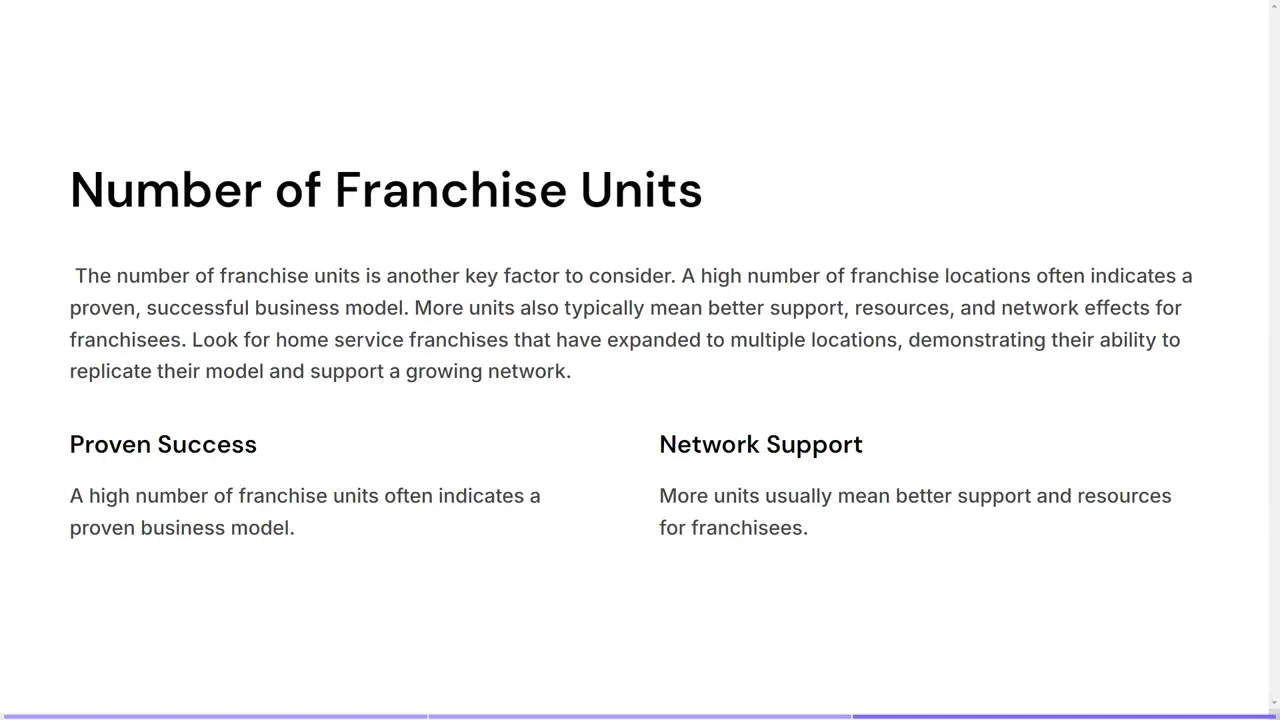
Emerging brands (10–50 units) can offer open territories and rapid growth potential. They may also present a higher upside if the leadership team is strong and the business model is proven in pilot markets. However, emerging franchises often lack robust Item 19 performance data in their FDD, and you’ll need to invest more in qualitative due diligence: what has the founding team done before? What is their vision for scaling?
Established brands (200–400+ units) provide more predictable benchmarks and clearer Item 7 investment ranges and Item 19 financial performance representations. The trade-off is more competition for territories and potentially less operational flexibility.
4) Culture Fit: You’re Not Buying Alone
Even if the numbers look great, culture matters. Franchise ownership is a partnership. You’ll lean on the franchisor for training, marketing support, and supply chain coordination. If you don’t resonate with the leadership team or the support model, you’ll face friction when scaling.
Ask yourself: Do I respect the franchisor’s philosophy? Do their communication style and responsiveness fit how I want to run my business? These qualitative questions are as important as the P&L projections.
5) Read the Franchise Disclosure Document (FDD): Item 7 & Item 19
The FDD is your roadmap. Item 7 outlines the initial investment range—everything from equipment to working capital. Item 19, when provided, reveals financial performance claims and is often the single most useful section for projecting returns.
Emerging brands sometimes lack a comprehensive Item 19. In that case, you’ll need to rely on flagship or corporate location data and examine whether those locations are genuinely representative of what a franchisee would experience.
6) Home Service Sectors: Where to Focus

Photo by Danish Charles on Unsplash
Popular home service categories include pest control, restoration, HVAC, plumbing, roofing, painting, and general home maintenance. My personal favorite is home maintenance services that bundle multiple recurring tasks—gutter cleaning, filter changes, smoke detector checks, and other preventative maintenance. These businesses can partner with property management firms that manage hundreds or thousands of doors, unlocking steady, scalable revenue.
When evaluating a sector, map the local demand, competitor density, and your ability to secure property management or commercial accounts. Those relationships turn one-off customers into long-term contracts.
7) Experience Isn’t Always Required — The Power of a Great Playbook
One of the great benefits of franchising is that you don’t always need deep technical expertise in the trade. I’ve seen HVAC franchises place multiple units where the new owners had zero HVAC background. They succeeded because they followed a repeatable system, hired the right technicians, and executed consistent marketing.
A quality franchisor should have a robust training program, hiring templates, and a playbook for field operations. Your job as the franchisee is to follow the system and manage the business side—sales, operations, and customer relationships.
8) How We Help: Assessment, Selection, and Financing
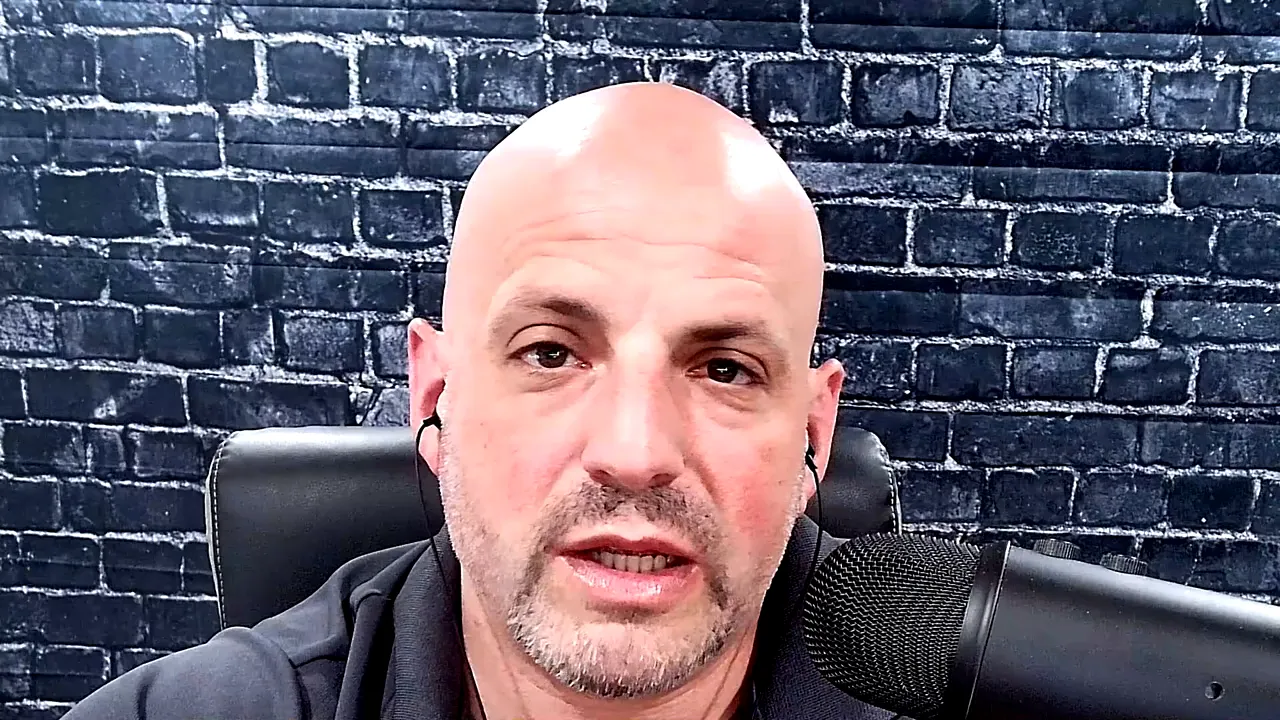
At my firm we start every candidate with a short business assessment. The goal: align your financial capability, lifestyle goals, and skills with the right franchise models. From there we recommend a short list—typically 7–10 brands—and encourage you to speak to at least three to compare support, unit economics, and marketing approaches.
We help clients explore startup franchises and resale opportunities and build funding strategies—most commonly using SBA financing with high leverage when appropriate. Whether you want a semi-absentee model while keeping your corporate job or you want a full-time operator role, the selection process must reflect your personal goals.
Business Ownership Coach® | Investor Financing Podcast is designed to guide that journey from assessment to acquisition, including identifying financing pathways and negotiating territory rights.
Photo by Vitaly Gariev on Unsplash
9) Practical Due Diligence Checklist
Here’s a practical checklist you can use immediately:
- Review Item 7 (investment) and Item 19 (financials) in the FDD.
- Confirm the existence and quality of recurring revenue streams and contract lengths.
- Ask about national accounts and what percentage of revenue they represent.
- Speak to current franchisees about onboarding, support, and profit margins.
- Assess culture fit with the franchisor leadership and support staff.
- Map territory availability and potential customer density.
- Build conservative 12–24 month cashflow forecasts and run multiple scenarios.
Following these steps reduces surprises and positions you to negotiate better territory terms or seller concessions on resale deals.
Conclusion: Take a Process-Oriented Approach
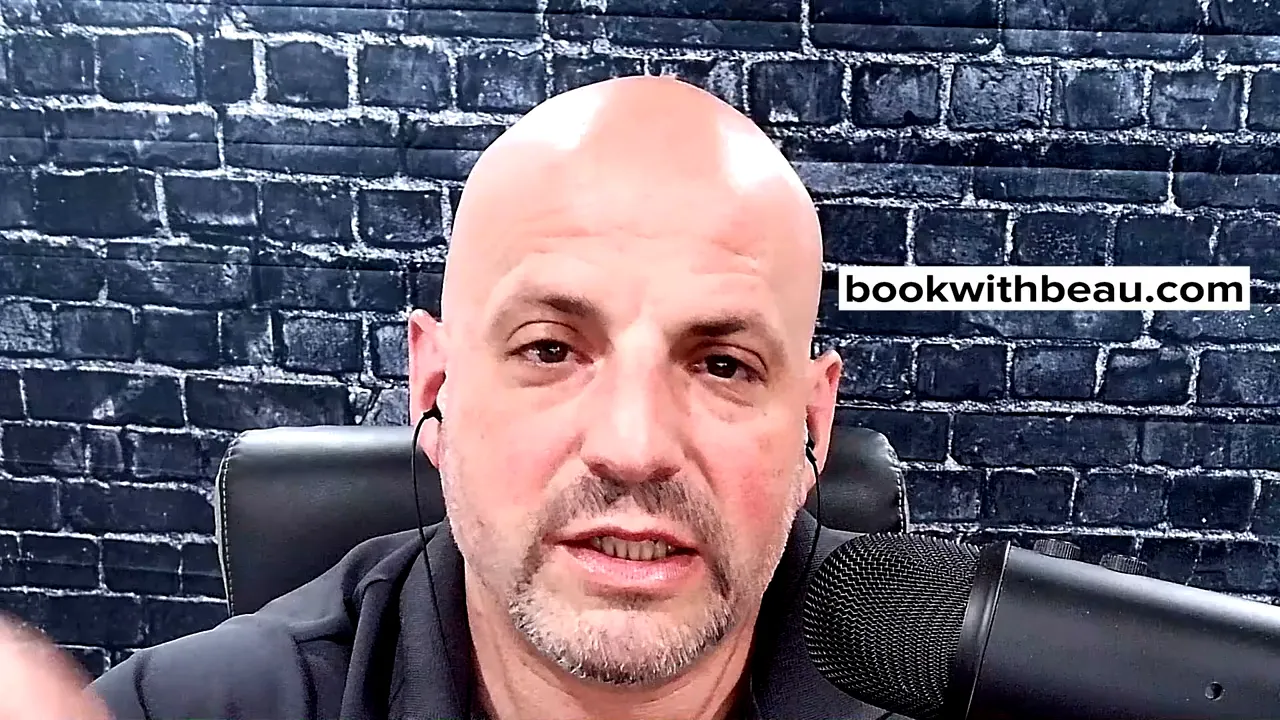
Buying a home service franchise can be a smart way to build a recurring-revenue business with relatively low overhead. But success comes from diligence: analyzing the FDD, understanding contract structures and national accounts, evaluating the franchisor team, and ensuring a culture fit. My team and I walk every client through a structured process that starts with a short assessment and ends with a confident acquisition decision—whether that’s a startup franchise, a resale, or an alternative business acquisition.
If you want help mapping options, comparing brands, or exploring SBA financing, schedule a call at bookwithbeau.com. As always, my mission on Business Ownership Coach® | Investor Financing Podcast is to empower you with the frameworks and financing knowledge to buy, build, and scale a profitable business.
